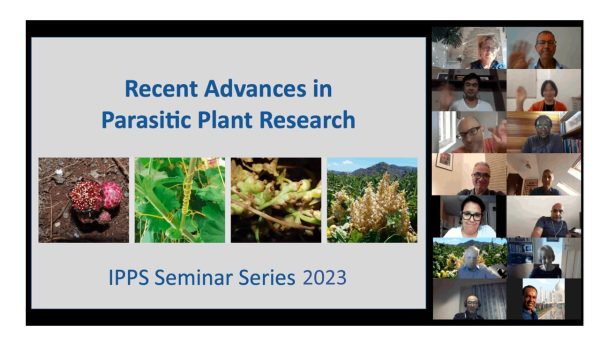James Bradley and Sylvia Mutunda
The 3rd 2023 monthly IPPS seminar will be held Wednesday 7 June at 4:00 pm central European time. You can use this website for time zone conversion. The next seminar will take place on 5 July, combined with the IPPS General Assembly.
On 7 June we will have the following talks:
James Bradley – The secret(ome)s of Striga and Cuscuta: What can we learn about virulence strategies of parasitic plants through inter-family secretome comparisons?
and
Sylvia Mutunda – Allele mining of the sorghum accession panel unravels new lgs1-1 mutants with resistance to the parasitic plant Striga
IPPS members can join the seminar by a Zoom link provided in the members area of the IPPS website.
Not a member yet, but want to join the seminar? You can register here for an IPPS membership!
4:00 PM cet = 7:00 AM Los Angeles, 9:00 AM Bogota, 10:00 AM New York/Santiago, 11:00 PM Brasilia, 3:00 PM Abuja/London, 4:00 PM Amsterdam/Berlin/Cape Town, 5:00 PM Tel Aviv/Nairobi, 10:00 PM Beijing, (next day) 11:00 PM Tokyo, 0:00 AM Canberra (next day)
James Bradley: I obtained my PhD in 2019 from The University of Sheffield in the lab of Prof. Julie Scholes. I used a range of -omics approaches to discover and analyse potential virulence factors used by parasitic plants in the genus Striga to successfully infect susceptible and resistant host plants. Currently, I am a postdoctoral fellow at The University of Toronto in the labs of Prof. Peter McCourt and Shelley Lumba (https://www.lumbalab.com/people). I am working on the perception of strigolactones in fungi, using yeast as a model system.
Abstract: Striga and Cuscuta are two genera of weedy parasitic plants that inflict huge agricultural damage, particularly on the African continent. Each parasitic plant genera evolved independently, and both have distinct life histories. Yet both must accomplish similar goals; penetrate the root (Striga spp.) or shoot (Cuscuta spp.) of their host plant while evading or suppressing a host immune response. As with other plant parasites, this is likely achieved in part through the deployment of secreted virulence factors (VFs) that can interact with components of host biology to facilitate colonisation. The availability of whole genome assemblies and the ease of in silico secretome predictions now permits multi-species comparisons of secretomes and comprehensive assessments of potentially secreted VFs. I will present a comparison of the Striga and Cuscuta secretomes. Specifically, I will describe orthogroup clustering and protein domain analyses that facilitated the identification of ‘Striga-specific’ secretome features (i.e. gene families or protein domains that were common or specific to Striga secretomes but absent or rare in Cuscuta secretomes). This analysis was complimented with transcriptome profiling of Striga hermonthica infecting a susceptible rice cultivar to identify differentially expressed genes during penetration of the host. The intersection-section of genes encoding secreted proteins that were ‘Striga-specific’ and that were differentially expressed during infection identified a small set of genes that are excellent candidate VFs in this parasitic plant and will be discussed.
Sylvia Mutinda is a Doctorate student of Molecular Biology and Biotechnology at Pan African University, Institute for Basic Sciences, Technology and Innovation. She doubles up as a research fellow at the Runo Lab, Kenyatta University, Kenya. Sylvia holds a Master’s degree in Biotechnology from Jomo Kenyatta University of Agriculture and Technology. Upon completion, she obtained a PhD fellowship from the Pan African University, an African Union initiative and which she’s currently finalising. She is a Mawazo fellow at The Mawazo Institute – a Kenyan-based organisation supporting the next generation of African women researchers and the uptake of home-grown and evidence-based solutions to local and global development needs. Sylvia’s research focus has been on use of advances in plant sciences (genomics, genetics and molecular biology) to manage the parasitic plant, Striga, which greatly limit production of Africa’s most staple cereals. In 2022, she was awarded research grants from the International foundation for Science (IFS) and the Mawazo fellows fund to support her research in harnessing natural sources of Striga resistance in sorghum.
Abstract: Sorghum is a food staple for millions of people in sub-Saharan Africa, but its production is greatly diminished by parasitic weeds of the Striga genus. An efficient and cost-effective way of managing Striga in smallholder farms of Africa is to deploy resistant varieties. Here, we leverage genomics and the vast genetic diversity of sorghum – evolutionarily adapted to cope with Striga parasitism in Africa – to identify new Striga resistant sorghum genotypes. We exploit a Striga resistance mechanism that hinges on essential communication molecules – strigolactones (SLs) exuded by hosts to trigger parasite seed germination. We mined for mutant alleles of the LOW GERMINATION LOCI 1 (LGS1) that are ineffective in stimulating Striga germination from the sorghum accession panel (SAP). Our analysis led us to identify new lgs1-1 sorghum genotypes which we named SAP- lgs1-1. SAP lgs1 had the SL exudation profile of known lgs1-1 sorghum whose hallmark is production of the low inducer of germination, orobanchol. Laboratory and field resistance screens showed that the SAP-lgs1-1 genotypes also exhibited remarkable resistance against Striga. By potentially reducing crop losses due to Striga parasitism, our findings have far-reaching implications for improving food security in Africa.
